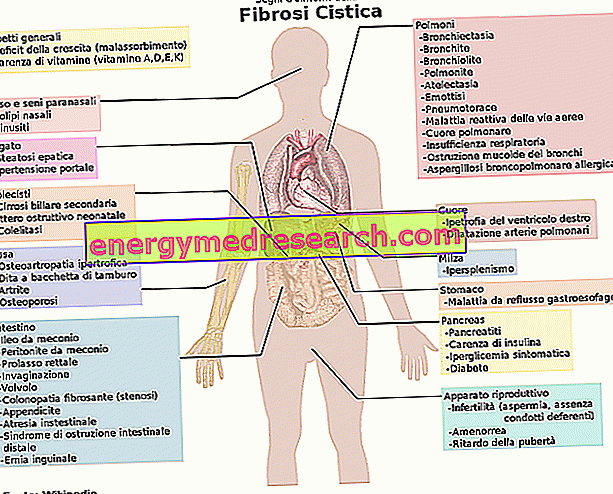Definition
"Benign prostatic hypertrophy" means an abnormal enlargement of the prostate gland, the structure responsible for producing an essential liquid for male reproductive function. The phenomenon is almost physiological in adult men over 50 years.
Causes
The causal factors involved in the manifestation of benign prostatic hypertrophy still remain the object of study; however, it seems that the increase in androgenic and estrogen sex hormones - favored by aging and associated with the sensitivity of the prostate gland to their action - is the most involved etiological factor.
Symptoms
Among the symptoms associated with benign prostatic hypertrophy, urinary incontinence, decreased urinary caliber and difficulty in passing urine certainly play a leading role. In addition to these, we recall: pain during urination, painful ejaculation, haematuria, need to urinate at night, polyuria, pollakiuria, bladder tenesmus.
Diet
Natural Care
The information on Drugs for the Treatment of Benign Prostatic Hypertrophy is not intended to replace the direct relationship between health professional and patient. Always consult your doctor and / or specialist before taking Benign Hypertrophy Treatment Drugs.
drugs
In the case of benign prostatic hypertrophy, drug therapy is essential and indispensable, in order to avoid the slow but unstoppable progression of symptoms and prevent complications (including acute urinary retention).
The following are the classes of drugs most used in therapy for the treatment of benign prostatic hypertrophy, and some examples of pharmacological specialties: it is up to the doctor to choose the most suitable active ingredient and posology for the patient, based on the cause, to the severity of the disease, and to the patient's response to treatment:
Antiandrogenic drugs : in particular, the drugs dutasteride and finasteride are specific inhibitors of 5-alpha reductase, the enzyme involved in the metabolization of testosterone into dihydrotestosterone, a powerful androgen sex hormone more active on the prostate.
The effect of antiandrogenic drugs on the prostate is surprising: the size of the prostate gland is reduced, urinary function is restored and obstruction symptoms are improved.
- Dutasteride (eg Avodart and Duagen): take 500 µg (0.5 mg) a day for a rather long period of time. It may also take 6 months of treatment before observing an improvement in symptoms.
- Finasteride (eg Finasteride, Sitas, Asterid, Ridestin, Proscar, Prostide): it is recommended to administer 5 mg of the drug per day. Generally, patients suffering from benign prostatic hypertrophy see the first therapeutic benefits after 6-12 months of treatment with Finasteride; in the event that, after this period of time, the patient does not find any positive results, the doctor will modify the therapy. However, it seems that the constant intake of this drug is effective in achieving both a lasting improvement in the symptoms of the urinary tract and a reduction in prostate volume.
Antiandrogenic drugs are preferred in therapy for the treatment of benign prostatic hypertrophy, especially for those patients with a particularly enlarged prostate.
Adrenergic agents (peripheral action): alpha blockers are widely used in therapy for the treatment of prostatic hypertrophy, since they act by relaxing the smooth muscles, inducing a significant increase in urinary flow and improving the symptoms of obstruction.
- Doxasozine (eg Atensil, CARDURA, Doxazosina alm, Noradox): this drug is used in the treatment of benign prostatic hypertrophy associated, in particular, with urinary retention and hypertension. It is recommended to start treatment by taking 1 mg of oral medication once a day (immediate-release tablet), or 4 mg / day after breakfast (prolonged-release tablets). For maintenance treatment, it is recommended to take an immediate-release tablet of 1-8 mg once a day or 4-8 mg when it comes to prolonged-release tablets. The dosage can be modified by the doctor based on the patient's response to treatment; the maximum recommended dose is 8 mg / day.
- Tamsulosin (eg Tamsulosina, Omnic, Pradif, Probena) is recommended to administer 0, 4 mg of drug per day, half an hour after the main meal, approximately always at the same time.
- Terazosin (eg. Ezosine, Terazosin, Prostatil, Itrin): start the therapy by taking 1 mg of the drug once a day, preferably at breakfast. Maintenance dose: increase the dosage gradually to 2 mg, 5 mg, 10 mg, once a day, in order to improve the patient's clinical profile.
- Alfuzosin (eg Alfuzosina HEX, Mittoval, Xatral): it is recommended to take 10 mg of active ingredient orally, immediately after the main meal, approximately always at the same time. This drug is particularly indicated in people over 65 years of age, in the case of acute urinary retention associated with benign prostatic hypertrophy: also in this case, it is recommended to administer 10 mg of drug per day. The duration of the therapy must be established by the attending physician.
- Prazosin (eg Minipress): start the therapy by taking 1 mg of active ingredient (tablets) 2-3 times a day. Continue the maintenance treatment with 6-15 mg a day, taken in divided doses according to the doctor's prescription. Being not very selective, this drug is not widely used for the treatment of benign prostatic hypertrophy.
- Silidosine (Silodyx): it is recommended to take one 8 mg capsule per day orally, in conjunction with meals by swallowing it whole with a glass of water. The recommended dose is one 8 mg capsule per day. For patients with moderate kidney problems, the starting dose is 4 mg once a day, and then possibly change to 8 mg once a day after a week. Silidosin is not recommended for patients with severe kidney problems.



